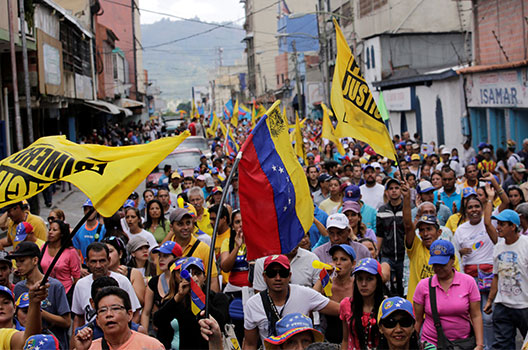 On September 1, hundreds of thousands of protesters took to the streets of Caracas, voicing their frustration with worsening food and medical shortages, frequent blackouts, and triple-digit inflation. Organized by the political opposition, the march called for a recall referendum to remove President Nicolás Maduro from power.
On September 1, hundreds of thousands of protesters took to the streets of Caracas, voicing their frustration with worsening food and medical shortages, frequent blackouts, and triple-digit inflation. Organized by the political opposition, the march called for a recall referendum to remove President Nicolás Maduro from power.
On Wednesday, September 14, the Atlantic Council’s Adrienne Arsht Latin America Center convened leading members of Venezuela’s opposition movement to discuss the aftermath of the march, the next steps for the opposition, and the need to hold the government accountable for the crisis in their country. The conference call was moderated by Peter Schechter, Director of the Adrienne Arsht Latin America Center, and featured Julio Andés Borges, Majority Leader of Venezuela’s National Assembly and National Coordinator of Movimiento Primera Justicia, and Juan Andrés Mejía, Deputy of Venezuela’s National Assembly and Co-founder of Voluntad Popular—the party led by Leopoldo López.
Despite President Maduro’s efforts to silence political activists and to prevent the protesters’ takeover of Caracas, both speakers saw the scope of the September march as representative of the future and unity of the opposition, a rarity in Venezuela, where political divisions have often been the source of in-fighting and political stagnation.
The speakers emphasized the recall referendum is the only remaining catalyst for change in the country, amid unbearable conditions. Both were optimistic the referendum would come to pass yet in 2016.
“We believe there will be a referendum vote this year. There is no other possibility,” Mejía said. “All of Venezuela has been suffering, and we think the government has no choice but to give the possibility of change. The referendum is the best strategy.”
Should the opposition succeed in replacing President Maduro, Mejía noted opposition party leaders are currently working on proposals to re-establish democracy, open a “humanitarian channel” to bring medical supplies into the country, and revive the collapsing economy.
“In the economic arena, there is a huge opportunity to move forward. Venezuela’s mineral resources are an opportunity to help the poorest of the poor, but we have to do it in a new way. Socialism has not been successful; we need to do something different,” Mejía stated.
In the coming weeks, Borges and Mejía emphasized that Venezuelans will continue peaceful demonstrations in demand of the recall. The speakers urged the international community to help Venezuela in its ongoing efforts to pressure the government.
“The strength of the Venezuelan people and the amount of obstacles we have overcome has been amazing. The demonstration of September 1 was the beginning of the new chapter of the final push to obtain the referendum this year, and there will be more demonstrations in all the Venezuelan cities,” Borges said.
Image: REUTERS/Henry Romero
